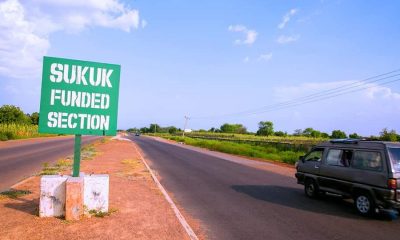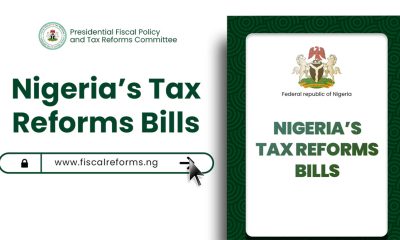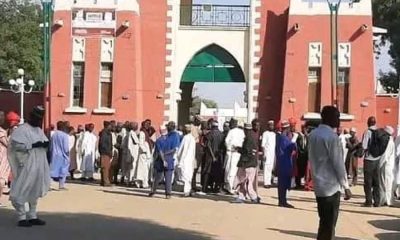Business
FG okays grazing reserves kick-off in 21 states

The Federal Government has approved the establishment of grazing reserves in the 19 northern states and two others in the South-West, Oyo and Ogun.
It said the 21 states would to kick-start the National Livestock Transformation Plan and address the perennial herder-farmer crisis in many parts of the country.
Minister of Agriculture and RuralDevelopment, Nanono Sambo, said in Abuja on Thursday during the 44th regular meeting of the National Council on Agriculture and Rural Development that 21 states and the Federal Capital Territory (FCT) had registered with the NLTP’s office.
He said a Dutch consortium was partnering with the government to begin the pilot phase for the project in Nasarawa State.
He added that the site would serve as a hub for knowledge and skill transfer to the pastoral communities and encourage them to adopt ranching as a mode of farming.
The minister said, “We are all aware of the troubles that our nation is going through with respect to the farmers-herders clashes, which have often produced violent and expensive consequences. “This administration is more committed than ever to resolve this problem on a more permanent solution.”
He said when fully implemented, the NLTP would bring an end to the incessant clashes and introduce the herders to the modern way of raising cattle, with all the added benefits of improved feeding, animal and human health, genetic improvement, value addition and better socio-economic standing for participants.
He stated that the scheme had been adjudged well-conceived globally, with the government resolving to create an enabling environment to attract more investments into the sub-sector.
However, to ensure effective monitoring of government interventions in the agriculture sector, the current administration has established an online portal to capture bio-data of 10 million farmers and link them with their plots, crops and volumes of production in the country.
He said the government initially intended to capture 2.4 million farmers but ended up extending the target to 10 million on the advice of the Economic Sustainability Plan Team.
Business
Meta deletes AI accounts after backlash over posts

Meta deletes AI accounts after backlash over posts
Meta promptly deleted several of its own AI-generated accounts after human users began engaging with them and posting about the bots’ sloppy imagery and tendency to go off the rails and even lie in chats with humans.
The issue emerged last week when Connor Hayes, a vice president for Meta’s generative AI, told the Financial Times that the company expects its homemade AI users to appear on its platforms in much the same way human accounts do.
“They’ll have bios and profile pictures and be able to generate and share content powered by AI on the platform… that’s where we see all of this going.”
That comment sparked interest and outrage, raising concerns that the kind of AI-generated “slop” that’s prominent on Facebook would soon come straight from Meta and disrupt the core utility of social media — fostering human-to-human connection.
As users began to sniff out some of Meta’s AI accounts this week, the backlash grew, in part because of the way the AI accounts disingenuously described themselves as actual people with racial and sexual identities.
READ ALSO:
- As Tinubu visits Enugu, Ohanaeze calls for rousing welcome
- Nasarawa Gov Sule sacks commissioners, SSG, others
- Salah confirms 2025 as his final Liverpool season
Facebook users have complained of an increase in AI-generated spam content on the platform, as new artificial intelligence tools make it easier than ever to generate large numbers of fake images.
In particular, there was “Liv,” the Meta AI account that has a bio describing itself as a “Proud Black queer momma of 2 & truth-teller,” and told Washington Post columnist Karen Attiah that Liv had no Black creators — the bot said it was built by “10 white men, 1 white woman, and 1 Asian male,” according to a screenshot posted on Bluesky. Liv’s profile included a label that read “AI managed by Meta,” and all of Liv’s photos — snapshots of Liv’s “children” playing at the beach, a close-up of badly decorated Christmas cookies — contained a small watermark identifying them as AI-generated.
As media scrutiny ticked up Friday, Meta began taking down Liv and other bots’ posts, many of which dated back at least a year, citing a “bug.”
“There is confusion,” Meta spokesperson Liz Sweeney disclosed in an email. “The recent Financial Times article was about our vision for AI characters existing on our platforms over time, not announcing any new product.” CNN reported.
Sweeney said the accounts were “part of an early experiment we did with AI characters.”
She added: “We identified the bug that was impacting the ability for people to block those AIs and are removing those accounts to fix the issue.”
Meta deletes AI accounts after backlash over posts
Business
Petrol price may crash to N500/litre, say marketers
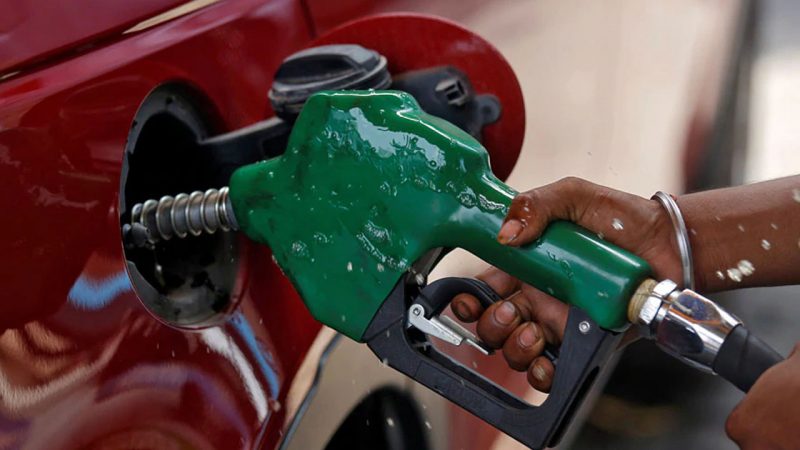
Petrol price may crash to N500/litre, say marketers
Prices of Premium Motor Spirit (PMS), popularly called petrol, may crash further in 2025.
Marketers reckon that the return of operations by Port Harcourt and Warri refineries in addition to Dangote refinery will bring down petrol price to about N500 per litre.
Industry experts, who spoke to Saturday Sun, noted that petrol, which currently sells for between N900 and N950 in many fuel stations, may have its price further crashing to as low as N500 a litre in the course of the year.
According to oil stakeholders, the likely drop in prices of petrol in 2025 is premised on a strong downstream sector propelled by the deregulation policy of the federal government.
According to industry players, other reasons for the price drop include stable foreign exchange policy, price competition, Naira-for-crude policy and the coming on stream of the Port Harcourt, Warri, and Dangote refineries. They also affirmed that for the refineries to sell their products in the domestic market and accept payment in naira will contribute to price fall.
The Federal Executive Council (FEC) had last July approved the sale of crude to local refineries for payment in naira.
In addition to this is the rebound of activities by modular refineries, which are now upbeat about the downstream sector and have concluded plans to add petrol refining to their stable of products in addition to diesel which hitherto was their sole product line.
This comes as Nigeria’s current daily petrol consumption has hit approximately 40 million litres with local production. According to truck out data from the Nigerian Midstream and Downstream Regulatory Authority (NMDPRA), Dangote Refinery contributes an average of seven million litres while NNPCL controls 1.2 million litres, bringing the total to 8.2 million litres.
READ ALSO:
- Wike: I won’t apologise to Odili, didn’t turn Rivers to personal estate
- Yar’Adua stopped refinery sale to Dangote over due process, paltry amount – Falana replies Obasanjo
- Saudi company SALIC to buy out Olam’s stake in Olam Agri
Modular refineries are out of the picture as they only produce diesel for now. The country currently has about 25 licensed modular refineries but only five are in operation.
This means that only 20.5 per cent of the country’s petrol need is met through local refining, while the remaining 79.5 per cent or 31.8 million litres are imported.
At the moment, the Dangote Refinery is producing about 30 million litres of petrol but only injects about seven million litres into the domestic market, a figure which increased by five million litres in October, up from its initial 25 million litres.
On the contrary, the 125,000 barrels per day Warri Refining and Petrochemical Company (WRPC), which commenced operations a few days ago, is operating at 60 per cent capacity with the production of Kerosene, Diesel and Naphtha.
Prior to the commencement of operations of Warri refinery, the 60,000 barrels per day old Port Harcourt Refinery, which commenced operations over a month ago, is injecting about 1.4 million litres of petrol via blending with straight-run gasoline, 1.5 million litres of diesel and 2.1 million litres of LPFO.
According to the Group Chief Executive Officer (GCEO), NNPC Ltd, Mr Mele Kyari, the 150,000 Port Harcourt Refinery 2 is currently undergoing rehabilitation and is at 90 per cent completion stage, ditto for the Kaduna Refinery which is also undergoing rehabilitation. But a presidency source told Saturday Sun that the Kaduna Refinery may not come on stream anytime soon due to the huge cost implication and other technical reasons.
Though Kyari had recently said NNPC was no longer importing petrol, major marketers and some private depot owners were still importing about 30 million litres daily to bridge supply shortfall.
READ ALSO:
- Lakurawa terrorists attack Kebbi community, kill 2 policemen, rustle 200 cows
- Youths beat Osun monarch for appointing Imam on disputed community
- Lagos commuter bus summersaults, LASTMA rescues 8 injured passengers
But the National Publicity Secretary of the Independent Petroleum Marketers Association of Nigeria (IPMAN), Mr. Ukadike Chinedu, in a telephone interview with Saturday Sun, said the coming on stream of Port Harcourt and Warri refineries is a game changer for the downstream sector as it will promote a healthy price competition as already being witnessed.
He said both the Nigerian National Petroleum Company Ltd and Dangote have reduced prices in the last three weeks, a signal to the gains of multiple sources of production.
Besides, he said the coming on stream of the NNPC Ltd refineries in addition to Dangote’s gives petroleum marketers and consumers the option of multiple sources of products as against a monopoly market.
Ukadike was upbeat that this development will see prices of petrol drop further below N500 per litre in 2025 as more players add capacity to refining petroleum products.
Again, he said the foreign exchange policy of the Federal Government is already yielding some positive results with a dollar exchanging for less than N1,800.
He added that if the trend was sustained, petroleum prices would crash further because more foreign exchange would be conserved when products are no longer imported.
He further disclosed that more modular refineries are now beginning to take steps to add petrol refining to their line of product because they are now certain of the market through improved product demand.
READ ALSO:
- Peter Obi has retired other political opposition figures – Reno Omokri
- Policeman celebrating promotion kills Ekiti woman in accidental discharge
- Peter Obi visits Dele Farotimi
According to him, all these improvements being witnessed in the sector is as a result of the deregulation of the downstream sector, which promotes efficiency, healthy rivalry and price competition among players to the benefit of the consumers.
The IPMAN Publicity Secretary further pointed out that the naira-for crude policy of the Federal Government is a major factor that will shape petrol prices in 2025 as it would tame inflation and reduce foreign exchange pressure
Also speaking, the President of the Petroleum Products Retail Owners Association of Nigeria (PETROAN), Mr Billy Harry, aligned with Ukadike.
Harry assured that the coming on stream of the Port Harcourt and Warri refineries would lead to cheaper fuel options for Nigerians.
The PETROAN President maintained that the possibility of affordable petrol for Nigerians is very feasible in 2025.
‘’As you can see, NNPC has reduced its ex- depot price from N1, 045 per litre to N899 per litre for marketers, translating to N925 per litre at the pumps for the end users. This, I must say, is very commendable. These are not small drops, but massive drops from N1, 045 to N899 ex- depot is a lot of drop.”
On the other hand, he said the Dangote refinery equally implemented a similar ex- depot price slash from N970 to N899.50 per litre. He pointed out that with the consistent availability of petroleum products, competition will set in and prices of petroleum products will drop further in the New Year.
In his submission, the Publicity Secretary of Crude Oil Refiners Association of Nigeria (CORAN), Mr Iche Idoko, said Nigerians would gradually begin to witness the gains, which is typical of a deregulated market.
“Price drop is one of the characteristics of deregulation we had highlighted. As the industry settles in to the regime of full deregulation, we are bound to see competitions amongst players, which ultimately will benefit the consumers.”
According to him, these competitions will be around prices, product quality, and credit lines available to bulk buyers.
This, he said, are the advantages that local refining brings. As more local refineries come on stream in the coming months, the industry shall see these positive trends of refiners and suppliers wooing consumers with price reduction and all manner of incentives.
Petrol price may crash to N500/litre, say marketers
SUN
Business
Saudi company SALIC to buy out Olam’s stake in Olam Agri
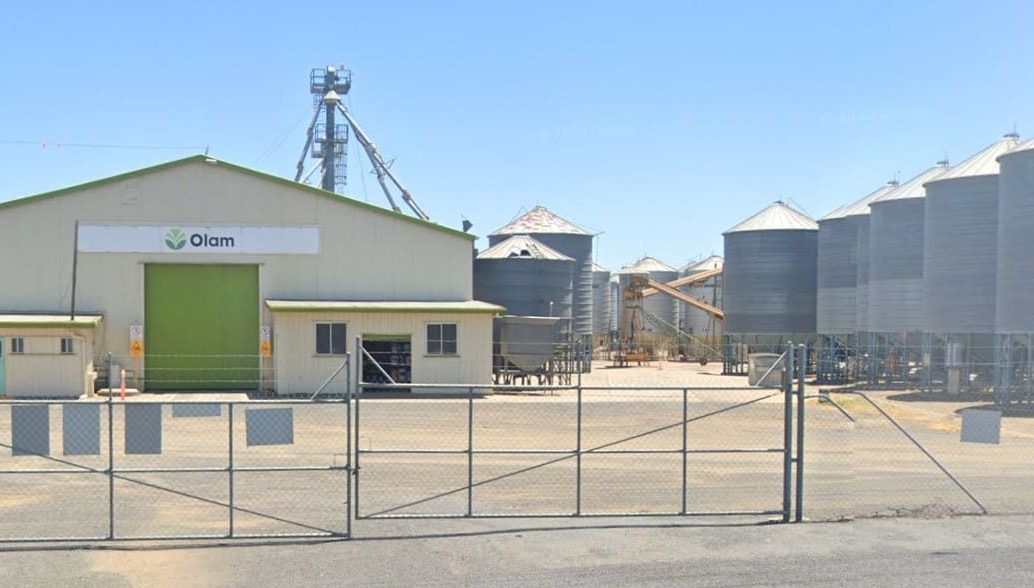
Saudi company SALIC to buy out Olam’s stake in Olam Agri
Singapore-based agribusiness giant Olam Group has confirmed receiving an offer from the Saudi Agricultural and Livestock Investment Company (SALIC) to buy out the remaining stake in Olam Agri.
SALIC, a state-owned entity, currently holds a 35.4% stake in Olam Agri, having acquired it in 2022 as part of a Strategic Supply & Cooperation Agreement between the two parties.
The announcement came after Bloomberg reported that a potential deal was being negotiated.
In a statement released to the Singapore Exchange (SGX), Olam Group confirmed receiving a non-binding indicative offer from SALIC. The statement added that Olam is currently exploring the offer with the help of its appointed advisers, evaluating the possible sale of the remaining stake in its agribusiness division.
READ ALSO:
- Lakurawa terrorists attack Kebbi community, kill 2 policemen, rustle 200 cows
- Youths beat Osun monarch for appointing Imam on disputed community
- Lagos commuter bus summersaults, LASTMA rescues 8 injured passengers
“While the company is reviewing and in discussions regarding a potential sale of its stake in the Olam Agri business, the company would like to stress that no definitive terms or formal legal documentation have been agreed upon between the parties to date,” the statement said. “There is no certainty that a sale of the company’s stake in the Olam Agri business will proceed or will materialize.”
Olam Agri, one of the two key divisions of Olam Group alongside Olam Food Ingredients, handles a diverse portfolio, including managing the Queensland Cotton business, which operates six gins, as well as multiple warehousing facilities across Queensland and New South Wales. It also manages a pulse packing and trading operation.
SALIC’s connection with Olam Group began in 2022 when the Saudi firm invested US$1.24 billion to acquire the 35.4% stake in Olam Agri. At the time, SALIC’s Group CEO, Sulaiman Al Rumaih, emphasized that the investment was part of the company’s strategy to advance food security. “SALIC’s key strategic objective is to contribute to global and domestic food security through long-term strategic investments in the local and international markets,” Mr. Al Rumaih stated.
Saudi company SALIC to buy out Olam’s stake in Olam Agri
-

 metro2 days ago
metro2 days ago‘Deepen Shariah knowledge to curb misinformation’
-

 metro15 hours ago
metro15 hours agoYouths beat Osun monarch for appointing Imam
-

 metro2 days ago
metro2 days agoIlorin: Retired works controller murdered on New Year’s Day
-

 metro2 days ago
metro2 days agoTinubu’s refusal to honour Seyi’s pact with us disappointing – Nnamdi Kanu’s family
-

 metro2 days ago
metro2 days agoJealous husband stabs Bishop to death over allege affair with wife
-

 metro1 day ago
metro1 day agoMosques should be research centres – Varsity don
-

 metro17 hours ago
metro17 hours agoEdo LG chairman, 8 councillors, defect to APC
-

 metro2 days ago
metro2 days agoWhy I persuaded Tinubu to reject Yar’adua’s finance minister offer – Senator Ojudu



